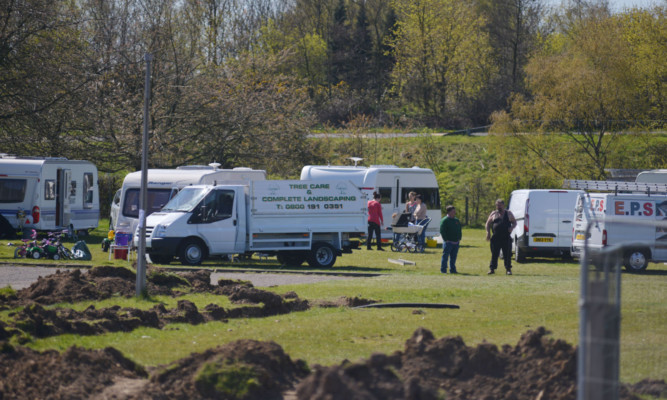Gypsy Travellers have been evicted 45 times from unauthorised encampments in Fife during the 2014 Travelling season, it has emerged.
The total costs to Fife Council in legal action, management and clean-up costs as of September 22 amounted to £30,500. This does not include costs incurred by private landlords in legal action and clean-up activities.
Of the 45 evictions, 21 were from a single, large group of Gypsy Travellers exceeding 20-30 caravans, which has camped without permission and caused “significant disruption” on sensitive areas in Kirkcaldy and Glenrothes.
The figures were revealed in a report to Fife Council’s executive committee, which updated proposals for pilot seasonal sites and a revision to the council’s co-operation policy.
Discussions are also continuing around the council’s push for legislation that would empower it to help private landowners evict travellers from private ground.
In May the committee agreed to identify as a matter of urgency a small number of potential seasonal sites, while recognising that the provision of extra sites was unlikely to eliminate unauthorised encampments in inappropriate locations.
At Tuesday’s committee, senior housing manager John Mills said work had been taken forward by the environment, enterprise and communities directorate task group.
The current policy was published in 2011 and sets out the rights and responsibilities of Gypsy Travellers and those of the settled and business communities.
The main focus for policy review is the need to ensure alternatives to unauthorised encampments are identified and clearer and more timeous action is taken to remove encampments, particularly when the encampments are large and located in sensitive areas.
A meeting was convened in August with the council’s advocate, legal services and administration leader and other officials.
The main agenda items were the use of legal provision to remove unauthorised encampments, potential assistance to private landowners and improved work with Police Scotland.
Possible seasonal sites yet to be publicly identified might be close to the edge of industrial estates due to ease of access and water supplies, the committee heard.
SNP group leader Peter Grant said it was vital communities were genuinely consulted at the earliest opportunity to avoid “misunderstandings”.
Council leader David Ross said no specific sites had been mentioned at this time because early discussions had to be taken “away from the glare of publicity”.
Outlining the next steps, Derek Muir, head of housing services, said: “The revised Fife cooperation policy is being discussed more fully with Police Scotland, to seek an improved operating procedure for the council and Police Scotland to collaborate to deal more effectively with larger unauthorised encampments in 2015.
“Following a conclusion with Police Scotland, discussions will be held with the Lord Advocate’s office and local procurator fiscal to ensure that the seasonal sites are regarded as suitable alternatives to unauthorised encampments, and the council gains the backing of the procurator fiscal to prosecute Gypsy Travellers if they refuse to abide by the policy and take up the alternatives provided.
“The response from the Scottish Government to engage in discussions about a change in current legislation to empower councils to take action to seek removal of unauthorised encampments on private ground is being pursued.
“The council needs to consider, over the short term, the establishment of one or two pilot seasonal sites for next Travelling season. Temporary planning consent will be required to take the proposal forward.”
